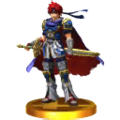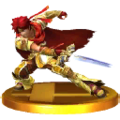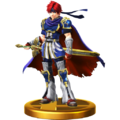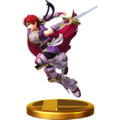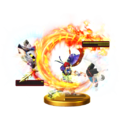Roy (SSB4)
| Roy in Super Smash Bros. 4 | |
|---|---|
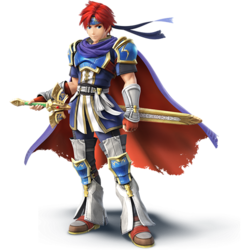 
| |
| Universe | Fire Emblem |
| Other playable appearance | in Melee |
| Availability | Downloadable |
| Final Smash | Critical Hit |
| “ | Roy Seals the Deal! | ” |
| —Introduction tagline | ||
Roy (ロイ, Roy) is a playable character in Super Smash Bros. 4 as the third downloadable character. First leaked through datamining of the 1.0.6 update, Roy would ultimately be revealed and was released alongside Lucas and Ryu on June 14th, 2015. Roy is also the third of three Super Smash Bros. Melee characters that were cut from Super Smash Bros. Brawl to return for Super Smash Bros. 4, after Dr. Mario and Mewtwo.
Roy is once again voiced by Jun Fukuyama, who reprises his role from Melee, mimicking some of his voice clips from Melee as well as providing some new ones. Like in Melee, Roy speaks Japanese regardless of the game's region, as with Marth.
Attributes
Roy's moveset is mostly based off of Marth, but with a number of differences, the most notable of which is his inverse of Marth's tipper mechanic: his Sword of Seals deals more damage and knockback near the hilt and less at its tip compared to Marth's Falchion. Roy's attributes are also very different. He has better mobility overall, with an above average walking speed, the 9th fastest dashing speed, the 3rd fastest air speed, and the 5th fastest falling speed, along with average weight. In addition, many of his attack animations were changed from Melee and now properly align with their hitboxes. These changes make him a semi-clone of Marth rather than a true clone.
Roy's attributes give him a different playstyle from Marth, as well as bringing him an array of advantages. Roy's attacks generally have quick start-up, and his high speed allows him to get in close to his opponent. His neutral aerial is perhaps his most versatile move. Its low start-up, lasting hitbox, and low landing lag make it an effective approach option, as well as a quick way to clear space, and it can start combos. His down tilt, with its quick start-up, low end-lag, and deceptive range, is useful for poking at the opponent and pressuring shields. Once Roy finds an opening, he has several ways in which to rack up damage. His jab is quick, and can easily lead into other moves, including his throws. His down and forward throws send opponents at favorable angles, and can combo into his jab, dash attack, forward tilt, neutral aerial, and Double-Edge Dance. Roy's neutral aerial is also a great combo tool, complementing his high speed by comboing into itself and his other aerials. His reversed sweetspot also helps with this. Since it is much larger than Marth's sweetspot, he gets the same amount of damage from his combos than Marth, who requires careful spacing for the same effect. As such, Roy has a much easier time closing in on the opponent and racking up damage compared to Marth.
Roy also boasts excellent KO power, with almost all of his sweetspotted attacks capable of KOing below 150%. However, he does not suffer from the penalties other characters with powerful movesets have, namely the generally slow start-up of their moves. His attacks are also easier to sweetspot than Marth's, and so Roy does not require precise spacing to reliably land a killing blow. Onstage, his main KOing options are his forward tilt, forward smash, up tilt and Blazer, due to their fast start-up and high power. Blazer is additionally an excellent out of shield option as it gives him access to super armor on start-up. His disjointed hitboxes grant him an effective offstage game as well. His forward and back aerials are quick, and cover wide arcs, and his down aerial is a moderately fast and powerful meteor smash. Flare Blade, with its charging ability, incredible power, huge hitbox, and deceptively low cool-down, is deadly against opponents who try to sweetspot the ledge. Roy's average weight and fast falling speed give him strong endurance, and he can make great use of rage, improving the knockback of his already powerful moves.
However, Roy is held back by a number of flaws. Most notably, while his reverse-tipper mechanic is one of his greatest strengths, it forces him to fight extremely close to his opponent, and his shorter range compared to Marth prevents him from spacing effectively. A whiffed move on Roy's part leaves him heavily open to punishment. Most of his moves, despite their quick start-up, have high ending lag, exacerbating the issue brought up by his relatively short range. He also suffers from a predictable approach. Though he has high speed, he has no quick options with which to close in and pressure the opponent outside of his neutral aerial, and this problem is made worse by his lack of a projectile. While his combo game is much better than Marth's, it has its flaws. Roy has few reliable combos past mid-percents due to his ending lag and his down throw having sub-par hitstun. Past low percents, enemies can easily tech or DI away from his forward throw. This forces him to rely on reads for combos at higher percents, especially on floaty characters, and can sometimes give him trouble KOing despite his fearsome power, as he has no guaranteed set-ups into his kill moves.
Roy's most glaring flaw is his recovery. Though Blazer offers excellent protection, can be angled, and grants decent horizontal distance, it gives little vertical recovery. Combined with his high falling speed, this leaves him helpless against meteor smashes, and even a solid semi-spike can send him too far to recover. Roy's high falling speed leads to another problem: he is very susceptible to combos. None of his moves are generally reliable enough to break through combos. Many characters can thus rack up large amounts of damage and easily force him offstage, where he could potentially lose his stock.
Overall, Roy has as many strengths as he has flaws. He boasts excellent speed and power, with a decent combo game, but suffers from his vulnerability to combos, poor recovery, predictable approach, and ironically short range for a sword character, making him a glass cannon. Despite initially being viewed as a threat, he has failed to gain significant tournament representation, as most of the professionals who play him use him only as a secondary, and thus he lacks noteworthy results.
Changes from Melee
Roy has been overall buffed in his transition from Melee to SSB4. His mobility has been greatly improved, with a faster dashing speed and one of the fastest air speeds in the game. His attacks deal more damage, and his sweetspotted attacks are considerably more powerful, giving him many more KOing options, thus alleviating his main weakness from Melee. His attack speed is overall faster, with his aerials having significantly reduced ending lag. He also significantly benefits from the addition of rage. Due to the improvements to his abysmal air game in Melee, it also significantly improves his combo game. He also has better survivability due to being heavier.
However, Roy has also received significant nerfs. Despite having a larger hurtbox, his attacks have much shorter range and hitbox durations. His already poor recovery has been both buffed and nerfed: his air speed is higher, and Blazer gives more horizontal distance, but it also covers less vertical distance, and Double-Edge Dance can no longer be used to slow his falling speed. Though Roy has been buffed overall and is now considered superior to Marth, Roy's standing relative to the cast is debatable, since most veterans were buffed to varying degrees.
Aesthetics
 Roy's design is a combination of his appearance as a Master Lord in Fire Emblem: The Binding Blade and his appearance as an Einherjar in Fire Emblem: Awakening. His eyes are also smaller and less anime-esque.
Roy's design is a combination of his appearance as a Master Lord in Fire Emblem: The Binding Blade and his appearance as an Einherjar in Fire Emblem: Awakening. His eyes are also smaller and less anime-esque. Roy has completely unique idle stances, as opposed to having variants of Marth's.
Roy has completely unique idle stances, as opposed to having variants of Marth's. Roy has an on-screen appearance.
Roy has an on-screen appearance. Roy's walking and jumping animations have been changed.
Roy's walking and jumping animations have been changed. In a similar vein to Marth's Falchion, Roy's Sword of Seals' trail indicates the sweetspot with a white arc. In Roy's case, it is near the Sword of Seals' hilt.
In a similar vein to Marth's Falchion, Roy's Sword of Seals' trail indicates the sweetspot with a white arc. In Roy's case, it is near the Sword of Seals' hilt. Most of Roy's sword swings aesthetically appear "heavier", as he now swings the Sword of Seals in a reverse grip or with both hands. As a result, Roy's Sword of Seals behaves like a heavier broadsword compared to Marth and Lucina's "lighter" Falchion and Parallel Falchion, which they swing with less effort.
Most of Roy's sword swings aesthetically appear "heavier", as he now swings the Sword of Seals in a reverse grip or with both hands. As a result, Roy's Sword of Seals behaves like a heavier broadsword compared to Marth and Lucina's "lighter" Falchion and Parallel Falchion, which they swing with less effort.
Attributes
 Due to the aforementioned alterations to his sword swings, many of Roy's attacks have altered hitbox placements compared to Marth's and decreased hitbox sizes.
Due to the aforementioned alterations to his sword swings, many of Roy's attacks have altered hitbox placements compared to Marth's and decreased hitbox sizes. Roy's heavier (85 → 95), making him a middleweight instead of a lightweight. This also makes him heavier than Marth.
Roy's heavier (85 → 95), making him a middleweight instead of a lightweight. This also makes him heavier than Marth. Roy dashes faster (1.61 → 1.91), surpassing Marth and giving him the ninth fastest dashing speed in the game.
Roy dashes faster (1.61 → 1.91), surpassing Marth and giving him the ninth fastest dashing speed in the game. Roy walks slower (1.2 → 1.15).
Roy walks slower (1.2 → 1.15). Roy's air speed is much faster (0.9 → 1.21), now being tied with Wario's as the third fastest air speed in the game.
Roy's air speed is much faster (0.9 → 1.21), now being tied with Wario's as the third fastest air speed in the game. Roy falls slower (2.4 → 1.8), though he still has the fifth fastest falling speed in the game.
Roy falls slower (2.4 → 1.8), though he still has the fifth fastest falling speed in the game. Roy now stands at Marth's height, which makes his hurtbox bigger. Despite this, he still has less range than Marth due to altered hitbox placements.
Roy now stands at Marth's height, which makes his hurtbox bigger. Despite this, he still has less range than Marth due to altered hitbox placements.
Ground attacks
 Neutral attack's animation has been changed. It is now a reverse gripped upward lifting slice.
Neutral attack's animation has been changed. It is now a reverse gripped upward lifting slice. Neutral attack deals more damage (4%/5%/6% → 4%/7%/7%), has decreased cooldown (interruptibility frame 26 → 23) and launches opponents at 62° when sweetspotted, which gives it improved combo ability.
Neutral attack deals more damage (4%/5%/6% → 4%/7%/7%), has decreased cooldown (interruptibility frame 26 → 23) and launches opponents at 62° when sweetspotted, which gives it improved combo ability. Neutral attack has increased start-up (frame 4 → 5), has decreased range, and its hitbox duration is 1 frame shorter.
Neutral attack has increased start-up (frame 4 → 5), has decreased range, and its hitbox duration is 1 frame shorter. Forward tilt's animation has been changed. It is now a reverse gripped inward reaping slash.
Forward tilt's animation has been changed. It is now a reverse gripped inward reaping slash. Forward tilt has more knockback (60 base/70 growth → 30 base/100 growth), has decreased start-up (frame 9 → 8) with decreased cooldown (interruptibility frame 40 → 32).
Forward tilt has more knockback (60 base/70 growth → 30 base/100 growth), has decreased start-up (frame 9 → 8) with decreased cooldown (interruptibility frame 40 → 32). Forward tilt's hitbox duration is 2 frames shorter.
Forward tilt's hitbox duration is 2 frames shorter. Up tilt's animation has been changed. Roy now swings his sword in a more overhead grip while bringing it to his side instead of behind him. The animation is more vertical than horizontal.
Up tilt's animation has been changed. Roy now swings his sword in a more overhead grip while bringing it to his side instead of behind him. The animation is more vertical than horizontal. Up tilt deals more damage (6%/8%/9%/10% → 7%/12%) making it much stronger despite its lower growth (116 → 103). It also has decreased start-up (frame 7 → 6) and decreased cooldown (interruptibility 40 → 39).
Up tilt deals more damage (6%/8%/9%/10% → 7%/12%) making it much stronger despite its lower growth (116 → 103). It also has decreased start-up (frame 7 → 6) and decreased cooldown (interruptibility 40 → 39). Up tilt's late hitbox duration is 2 frames shorter.
Up tilt's late hitbox duration is 2 frames shorter. Down tilt has decreased start-up (frame 8 → 7) and now sends opponents at 30°, making it much better for edge-guarding and to set-up a tech-chase.
Down tilt has decreased start-up (frame 8 → 7) and now sends opponents at 30°, making it much better for edge-guarding and to set-up a tech-chase. Down tilt has increased cooldown (interruptibility frame 20 → 22). Due to it now sending opponents at a horizontal trajectory, its combo ability has been almost completely removed. Its hitbox duration is also 1 frame shorter. The sweetspotted down tilt deals less damage (12% → 11%).
Down tilt has increased cooldown (interruptibility frame 20 → 22). Due to it now sending opponents at a horizontal trajectory, its combo ability has been almost completely removed. Its hitbox duration is also 1 frame shorter. The sweetspotted down tilt deals less damage (12% → 11%). Dash attack's animation has slightly changed. Roy now performs an inward sweeping slash into a braking stop.
Dash attack's animation has slightly changed. Roy now performs an inward sweeping slash into a braking stop. Dash attack deals 1% more damage (12% → 13%) and has increased knockback (70 base/55 growth → 65 base/82 growth).
Dash attack deals 1% more damage (12% → 13%) and has increased knockback (70 base/55 growth → 65 base/82 growth). Dash attack has increased start-up (frame 12 → 13) and increased cooldown (interruptibility frame 40 → 50).
Dash attack has increased start-up (frame 12 → 13) and increased cooldown (interruptibility frame 40 → 50). Forward smash's animation has slightly changed. Roy now brings his sword behind himself and then slashes forward in a reaping two-handed slash from a turn. This animation is somewhat similar to Mii Swordfighter's.
Forward smash's animation has slightly changed. Roy now brings his sword behind himself and then slashes forward in a reaping two-handed slash from a turn. This animation is somewhat similar to Mii Swordfighter's. Forward smash has increased knockback growth (65 → 70).
Forward smash has increased knockback growth (65 → 70). Forward smash has increased start-up (frame 12 → 14), increased cooldown (interuptibility frame 54 → 55), decreased vertical reach, and its hitbox duration is 1 frame shorter. It now has a "mediumspot" in the center of the blade that deals damage in between the sourspot and sweetspot, which effectively makes the sweetspot smaller.
Forward smash has increased start-up (frame 12 → 14), increased cooldown (interuptibility frame 54 → 55), decreased vertical reach, and its hitbox duration is 1 frame shorter. It now has a "mediumspot" in the center of the blade that deals damage in between the sourspot and sweetspot, which effectively makes the sweetspot smaller. Up smash's animation has slightly changed. It now has fiery graphical effects and an explosion on the last hit.
Up smash's animation has slightly changed. It now has fiery graphical effects and an explosion on the last hit. Up smash deals 0.44% more damage (16.56% → 17%) due to changes to stale-move negation. It also has decreased start-up (frame 15 → 12) the spike hitbox now properly knocks opponents into the other hits, and has partial intangibility on Roy's arm.
Up smash deals 0.44% more damage (16.56% → 17%) due to changes to stale-move negation. It also has decreased start-up (frame 15 → 12) the spike hitbox now properly knocks opponents into the other hits, and has partial intangibility on Roy's arm. Up smash has increased cooldown (interruptibility frame 46 → 59), its last hit has decreased base knockback (73 → 70) and its hitbox lasts 2 frames shorter.
Up smash has increased cooldown (interruptibility frame 46 → 59), its last hit has decreased base knockback (73 → 70) and its hitbox lasts 2 frames shorter. Fully charged down smash deals 7% less damage (28% → 21%). Both of its hits' duration last 1 frame shorter.
Fully charged down smash deals 7% less damage (28% → 21%). Both of its hits' duration last 1 frame shorter. Down smash's back hit deals 2% more damage (16%/8% → 18%/10%). It also has decreased cooldown (interruptibility frame 72 → 63) and launches foes at a more horizontal trajectory.
Down smash's back hit deals 2% more damage (16%/8% → 18%/10%). It also has decreased cooldown (interruptibility frame 72 → 63) and launches foes at a more horizontal trajectory. The knockback properties of Roy's down smash have been reversed, with the back hit being stronger.
The knockback properties of Roy's down smash have been reversed, with the back hit being stronger.
Aerial attacks
 All aerials have decreased aerial cooldown (interruptibility frame 50 → 46 (neutral), interruptibility frame 49 → 42 (up), interruptibility frame 64 → 52 (down), interruptibility frame 35 → 30 (forward), interruptibility frame 43 → 36 (back)).
All aerials have decreased aerial cooldown (interruptibility frame 50 → 46 (neutral), interruptibility frame 49 → 42 (up), interruptibility frame 64 → 52 (down), interruptibility frame 35 → 30 (forward), interruptibility frame 43 → 36 (back)). Neutral, forward and back aerials deal more damage (4%, 8%/5% → 4%/6%, 8.5%/5% (neutral), 8%/5% → 11%/7% (forward), 9%/6% → 12%/9% (back)). They are also stronger to the point of being able to KO reliably.
Neutral, forward and back aerials deal more damage (4%, 8%/5% → 4%/6%, 8.5%/5% (neutral), 8%/5% → 11%/7% (forward), 9%/6% → 12%/9% (back)). They are also stronger to the point of being able to KO reliably. Neutral aerial now sends opponents at a higher trajectory (Sakurai angle → 50°) allowing for more combo potential. It's first and second hits come out earlier (frame 7-8 → frame 6-7 (hit 1), frame 17-20 → frame 15-21 (hit 2)).
Neutral aerial now sends opponents at a higher trajectory (Sakurai angle → 50°) allowing for more combo potential. It's first and second hits come out earlier (frame 7-8 → frame 6-7 (hit 1), frame 17-20 → frame 15-21 (hit 2)). Forward aerial's animation has slightly changed. Roy's legs are now positioned differently while he swings his sword while leaning forward with his right side more exposed.
Forward aerial's animation has slightly changed. Roy's legs are now positioned differently while he swings his sword while leaning forward with his right side more exposed. Forward and down aerials have increased start-up (frame 5-7 → frame 10-12 (forward), frame 7-10 → 16-17 (down)).
Forward and down aerials have increased start-up (frame 5-7 → frame 10-12 (forward), frame 7-10 → 16-17 (down)). Up aerial's hitbox lasts 2 frames longer (5 frames → 7 frames) and it also deals more knockback, making it a better juggling option.
Up aerial's hitbox lasts 2 frames longer (5 frames → 7 frames) and it also deals more knockback, making it a better juggling option. Roy has a new down aerial, a two-handed slash below himself similar to Ike's. Compared to his previous down aerial, it is much more useful overall due to its aforementioned decreased aerial cooldown, all of its hitboxes having stronger damage outputs (6%/9% → 10/15%) and its sourspot now being able to KO grounded opponents around 160%. It also has extended reach underneath Roy and has a much more favorable placement for the meteor smash hitbox that makes it significantly easier to land. With proper timing, its meteor smash can also be used from a forward aerial to perform a Ken Combo.
Roy has a new down aerial, a two-handed slash below himself similar to Ike's. Compared to his previous down aerial, it is much more useful overall due to its aforementioned decreased aerial cooldown, all of its hitboxes having stronger damage outputs (6%/9% → 10/15%) and its sourspot now being able to KO grounded opponents around 160%. It also has extended reach underneath Roy and has a much more favorable placement for the meteor smash hitbox that makes it significantly easier to land. With proper timing, its meteor smash can also be used from a forward aerial to perform a Ken Combo. Down aerial has decreased diagonal reach. Its hitbox lasts 2 frames shorter.
Down aerial has decreased diagonal reach. Its hitbox lasts 2 frames shorter.
Throws/Other Attacks
 Roy can no longer chain grab.
Roy can no longer chain grab. All of Roy's grabs have significantly less range.
All of Roy's grabs have significantly less range. Roy's dash grab comes out 2 frames earlier (frame 10 → 8).
Roy's dash grab comes out 2 frames earlier (frame 10 → 8). Down throw now sends opponents directly above Roy, making it much better for follow-ups.
Down throw now sends opponents directly above Roy, making it much better for follow-ups. Up throw deals 1% more damage (5% → 6%).
Up throw deals 1% more damage (5% → 6%). Pummel and down throw deal 1% less damage (3% → 2% (pummel), 6% → 5% (down throw)).
Pummel and down throw deal 1% less damage (3% → 2% (pummel), 6% → 5% (down throw)). Front and back floor attacks deal 1% more damage (6% → 7%).
Front and back floor attacks deal 1% more damage (6% → 7%).
Special moves
 Flare Blade has much less ending lag, with Roy now being able to act out of it almost immediately. It can also be charged up to a maximum of 48% without causing recoil damage (41% → 48%).
Flare Blade has much less ending lag, with Roy now being able to act out of it almost immediately. It can also be charged up to a maximum of 48% without causing recoil damage (41% → 48%). Flare Blade has slightly increased start-up, a smaller hitbox, and takes slightly more time to fully charge. The attack now has a sourspot at the edges of the attack that deals decreased damage (50% → 35%) and significantly decreased knockback.
Flare Blade has slightly increased start-up, a smaller hitbox, and takes slightly more time to fully charge. The attack now has a sourspot at the edges of the attack that deals decreased damage (50% → 35%) and significantly decreased knockback. Flare Blade has a different sound effect when charging; when fully charged, the sound vanishes before the move's explosion. All stages of the attack now unleash a minor explosion, with most of the higher stages unleashing the original large explosions from Melee. Its fiery effects are also more intense.
Flare Blade has a different sound effect when charging; when fully charged, the sound vanishes before the move's explosion. All stages of the attack now unleash a minor explosion, with most of the higher stages unleashing the original large explosions from Melee. Its fiery effects are also more intense. Double-Edge Dance requires less technical precision. Aside from the first and fourth downward hits, every other hit has decreased start-up.
Double-Edge Dance requires less technical precision. Aside from the first and fourth downward hits, every other hit has decreased start-up. Each hit of Double-Edge Dance possesses less vertical reach and deals less damage and knockback. The first hit of Double-Edge Dance has 1 more frame of start-up and no longer slows Roy's falling speed, no longer aiding recovery, Double-Edge Dance now has Transcendent priority meaning it can no longer cancel projectiles and, Double-Edge Dance's third upwards input no longer meteor smashes.
Each hit of Double-Edge Dance possesses less vertical reach and deals less damage and knockback. The first hit of Double-Edge Dance has 1 more frame of start-up and no longer slows Roy's falling speed, no longer aiding recovery, Double-Edge Dance now has Transcendent priority meaning it can no longer cancel projectiles and, Double-Edge Dance's third upwards input no longer meteor smashes. The variants of Double-Edge Dance's third hit can no longer KO, but can easily combo into the fourth hit.
The variants of Double-Edge Dance's third hit can no longer KO, but can easily combo into the fourth hit. Double-Edge Dance now uses Marth's animations from Brawl.
Double-Edge Dance now uses Marth's animations from Brawl. Double-Edge Dance's third downwards input is no longer has multiple hits and sends foes at a lower trajectory making it easier to combo into the fourth hit.
Double-Edge Dance's third downwards input is no longer has multiple hits and sends foes at a lower trajectory making it easier to combo into the fourth hit. Blazer's last hit is much stronger, now being able to KO at high percents as well as having lasting hitboxes near its peak. It also has intangible frames on start-up if used from the ground. It now grants much more horizontal momentum near its peak, and can be tilted left or right before start-up to cover a notable amount of horizontal range.
Blazer's last hit is much stronger, now being able to KO at high percents as well as having lasting hitboxes near its peak. It also has intangible frames on start-up if used from the ground. It now grants much more horizontal momentum near its peak, and can be tilted left or right before start-up to cover a notable amount of horizontal range. Blazer deals 4% less damage (20% → 16%) and travels less vertical distance.
Blazer deals 4% less damage (20% → 16%) and travels less vertical distance. Blazer's first hit has much lower set knockback. This allows every hit to connect even better than in Melee at the loss of its ability to one-hit KO the lightest characters.
Blazer's first hit has much lower set knockback. This allows every hit to connect even better than in Melee at the loss of its ability to one-hit KO the lightest characters. Roy now performs Blazer while wielding the Sword of Seals in a reverse grip. Roy also has a new helpless animation upon using it.
Roy now performs Blazer while wielding the Sword of Seals in a reverse grip. Roy also has a new helpless animation upon using it. Counter has seven more counter frames. It also has increased knockback and can now KO off of countered smash attacks starting under 40%. The move's horizontal range is also longer.
Counter has seven more counter frames. It also has increased knockback and can now KO off of countered smash attacks starting under 40%. The move's horizontal range is also longer. Counter's damage multiplier has been decreased (1.5x → 1.35x).
Counter's damage multiplier has been decreased (1.5x → 1.35x). Counter's animation has slightly changed. Roy now holds his hand out for the entirety of the move, along with pointing his sword downward instead of upward. His counterattack animation is now a low-angled, one-handed outward slash.
Counter's animation has slightly changed. Roy now holds his hand out for the entirety of the move, along with pointing his sword downward instead of upward. His counterattack animation is now a low-angled, one-handed outward slash. Roy has a Final Smash, Critical Hit. Unlike Marth's and Lucina's, Roy's is stationary rather than propelling him at high speed in a straightforward line.
Roy has a Final Smash, Critical Hit. Unlike Marth's and Lucina's, Roy's is stationary rather than propelling him at high speed in a straightforward line.
Update history
It is unclear whether Roy has been buffed or nerfed since update 1.1.0. Blazer was given additional hitboxes, making the move easier to land, but the damage reduction on the first and last hits slightly weakens its KO power. In addition, the changes to shield mechanics in 1.1.0 and 1.1.1 have made his sweetspotted attacks much safer at the cost of his sourspotted attacks being less safe, to the point where his semi-clone, Lucina, has overall safer attacks than him. However, even though he benefits less than Lucina, he benefits more than Marth due to his sweetspot hitboxes being easier to land. Ultimately, Roy's changes are not significant enough to affect his prowess compared to the rest of the cast.
 Blazer has additional hitboxes.
Blazer has additional hitboxes. Blazer's first and last hits deal 1% less damage.
Blazer's first and last hits deal 1% less damage.
Moveset
| Name | Damage | Description | ||
|---|---|---|---|---|
| Neutral attack | 7.5% (sweetspot), ≈4.65% (sourspot) | Slashes his sword upwards in a reverse grip, ending at shoulder height. Easily combos into itself, grab, and forward tilt at low percentages, and his forward and up aerials at higher percentages. A great spacing and combo tool and one of Roy's most useful attacks. | ||
| Forward tilt | 12.5% (sweetspot), 9% (near), 8% (far) | Swings his sword downwards in a reverse grip while stepping forwards, stopping the end motion with his left-hand. Hits very hard for a tilt when sweetspotted, usually KOing around 120% from mid-stage. | ||
| Up tilt | 12% (sweetspot), 7% (sourspot) | Does a wide-arced slash above his head to the left in a reverse grip. Very strong along with his forward tilt, usually KOing at around 110% sweetspotted. However, it has rather low horizontal range and some ending lag. | ||
| Down tilt | 11% (sweetspot), 6.5% (sourspot) | Crouches and briskly thrusts his sword at the enemy's feet. Much weaker than Roy's other tilts, but it has the least ending lag and is good for tech chasing and edge-guarding. | ||
| Dash attack | 13% (sweetspot), 9% (sourspot) | Leaps forward briefly before dealing a low-angle horizontal slash to the left. Has good KO potential when sweetspotted at around 130%, however it has moderate start-up and high ending lag, making it very unsafe on shield. | ||
| Forward smash | 20% (close), 17% (mid), 12% (far) | Leans forward and does a two-handed crescent slash downwards after spinning around. Hits on frame 14-15, which is rather fast for a forward smash of its power. It is one of the strongest forward smashes in the game if sweetspotted at the hilt of his sword, and has become somewhat infamous for KOing at percents as low as 40% with rage. It additionally has a very long disjoint as Roy leans forward while performing it. However, it has high ending lag and its hitbox does not last long, leaving him very vulnerable to attacks if the swing misses. | ||
| Up smash | Flame Sword | 1% (hit 1), 2% (hits 2-4), 10% (hit 5) | Thrusts his sword skyward as its tip ignites in flames, with an explosion on the final hit. Powerful enough to KO middleweights around 100% while uncharged. Good for guarding opponents in the air, as Roy's arm gains invincibility during the attack and if it hits someone that is not on the ground (with all hits), it does additional damage and knockback. High end lag, like his other smashes. | |
| Down smash | 15% (front, sweetspot), 17% (back, sweetspot) 10% (front, sourspot), 11% (back, sourspot) | Briskly sweeps his sword in front and then behind him. Weaker than his other smash attacks, but it comes out the quickest, and is useful for punishing rolls. Can KO uncharged in the 120% range if sweetspotted with the front hit and around 100% sweetspotted with the back hit. However, while it has very quick start up, it has the longest end lag of all his smashes making it extremely punishable when whiffed. | ||
| Neutral aerial | 6%/4% (first hit, sweetspot/sourspot), 8%/5% (second hit, sweetspot/sourspot) | Quickly swipes to the left with the back of the blade, then swipes again while spinning. The second hit is capable of attacking behind him. A useful spacing and combo option due to its quick start-up and low landing lag. | ||
| Forward aerial | 11%/7% (sweetspot/sourspot) | Swings his sword one-handedly in a downwards slash. If sweetspotted, this move deals decent knockback which can KO opponents early near the edge. Good for air-to-air combat because of its low ending lag, but unsafe to spam in neutral as it has moderately high landing lag (16 frames). However, it is possible to jump out of one in a short hop. | ||
| Back aerial | 12%/9% (sweetspot/sourspot) | Spins towards the left, using the motion to slash upwards with a one-handed underhand swing. Good KO potential when sweetspotted, and can get early KOs when used off-stage. Covers good vertical and horizontal range. It has the interesting property of turning Roy around when used. Moderately high landing lag (19 frames). | ||
| Up aerial | 9%/6% (sweetspot/sourspot) | Does a backflip and swings with a wide arc above him before righting himself again, in a similar manner to Marth's up aerial. The weakest of Roy's aerials in terms of dealing damage, and is mainly used for juggling and/or combos. | ||
| Down aerial | 15%/10% (sweetspot/sourspot) | Spreads his legs in the air before slicing downwards with a two-handed slash, similarly to Ike's down aerial. Meteor smashes powerfully when hit with the sword's hilt, while it launches opponents upward if not hit with the hilt. Considerable ending and landing lag. KOs on stage sweetspotted around 130%. | ||
| Grab | — | Bends forward and reaches out with his left hand. | ||
| Pummel | 2% | Knee strikes the opponent. A fairly fast pummel. | ||
| Forward throw | 5% | Throws the opponent forward with a spin. Has low ending lag, allowing it to combo into a neutral attack or forward tilt at low percents and a dash attack at medium percents. Also combos very well with his neutral aerial, which when hit can lead into even more combos. | ||
| Back throw | 5% | Flings the opponent over his shoulder and behind him. If the opponent does not expect it, this can lead into down aerial at low percents or a back aerial for a KO at high percents near the ledge, though the latter requires good timing. | ||
| Up throw | 6% | Tosses the opponent upwards with his right hand. His strongest throw, it can KO at very high percents, starting at 180%. | ||
| Down throw | 5% | Slams the opponent onto the floor in front of him with his left hand. Good combo potential, as it sends the opponent above Roy. This is made better by the fact that it has low base knockback and low knockback scaling. However, its hitstun is lackluster making it unreliable on floaties and other characters above low percents. | ||
| Forward roll Back roll Spot dodge Air dodge |
— | — | ||
| Techs | — | — | ||
| Floor attack (front) Floor getups (front) |
7% | Slashes to the left, then the right as he gets up. | ||
| Floor attack (back) Floor getups (back) |
7% | Gets into a kneeling position and then does a spinning cut as he gets up. | ||
| Floor attack (trip) Floor getups (trip) |
5% | Hops briskly to his feet then does a stab to the left and a slash to the right. | ||
| Edge attack Edge getups |
8% | Does a handstand and flips himself onto the stage, then slashes horizontally to the right. | ||
| Neutral special | Default | Flare Blade | 6%-45%, (50% fully charged sweetspot), (36% fully charged sourspot) | A move similar to Ike's Eruption, Roy charges the Sword of Seals with flames for a maximum of five seconds before slamming its blade onto the ground to unleash an explosion. The explosion's size grows as it charges. With high base knockback at almost all charge levels and very high knockback scaling, a barely charged Flare Blade is one of Roy's most viable KOing options. Fully charged, it is capable of one-hit KOing every single character in the game, except Bowser and Shulk with Monado Shield equipped, from the center of Final Destination. A fully charged explosion deals 10% recoil damage to Roy. Despite its power, the move has surprisingly little endlag, with Roy being able to act out of it almost immediately. The attack also has a sourspot at the edges that deals much less damage and knockback and is not a OHKO, instead KOing at 41%. Probably the best option to use on an opponent with a broken shield in the entire game because of its OHKO potential when fully charged, especially considering Roy's good shield pressuring capability. |
| Custom 1 | N/A | |||
| Custom 2 | N/A | |||
| Side special | Default | Double-Edge Dance | 3%-5% (first hit), 2%-3% (second forward hit), 2%-3% (second upward hit), 1%-3% (second downward hit), 2%-3% (third forward hit), 3% (third upward hit), 4% (third downward hit), 6% (final forward hit), 5% (final upward hit), 2% (final downward hits 1-4), 6% (final downward hit 5) | A combination of sword slashes in a fashion identical to Marth and Lucina's Dancing Blade. The type of slashes he performs can be influenced by directional inputs, the attacks being little to no difference in animation from Marth and Lucina's, though the knockback is slightly stronger on Roy's end. |
| Custom 1 | N/A | |||
| Custom 2 | N/A | |||
| Up special | Default | Blazer | 5%/4% (hit 1, sweetspotted/sourspotted), 1% (hits 2-4), 8%/7% (hit 5, sweetspotted/sourspotted) | Performs a slow rising slash infused with fire that deals multiple hits, which can also be angled diagonally. Grants super armor at the beginning of the move. If all of its hits connect, it KOs at around 110% on the ground. A viable out of shield or KOing option because of the super armor frames at the beginning of the move. |
| Custom 1 | N/A | |||
| Custom 2 | N/A | |||
| Down special | Default | Counter | 1.35x damage multiplier (min 8%) | A counter similar to other counterattacks, with Roy performing a parry and then retaliating against any attacks that hit him during its counter frames with a fiery slash. Damage and knockback dealt depends on the move that is countered, with a damage multiplier of 1.35x. Roy may additionally say "いまだ!" ("Not yet!") or "そこ!" ("There!") if successful. |
| Custom 1 | N/A | |||
| Custom 2 | N/A | |||
| Final Smash | Critical Hit | 1% (1-10 hits), 35% (ending hit) | Roy swings the Sword of Seals in a fully circular arc before slamming it downwards, generating a powerful explosive slash that engulfs the attacked area in flames. Unlike Marth and Lucina's Critical Hit, Roy's is not a one-hit KO. The circular trail can connect up to four times from the front; if the move is performed with an enemy behind Roy, it can hit up to ten times, which traps the opponent until the final slash is dealt. | |
On-screen appearance
- Appears from a spell circle, similar to others from his franchise, albeit crouching. The Sword of Seals is stuck in the ground when he appears, and Roy pulls it out before assuming his idle stance.
Taunts
- Up taunt: Triumphantly holds the Sword of Seals above his head pointing towards the side, unlike Marth, who points it skywards.
- Side taunt: Winds back before posing, holding the Sword of Seals backhanded toward the screen while saying "僕 は 負けない!", which translates to "I won't lose!" This line was one of his victory quotes in Melee.
- Down taunt: Kneels and the Sword of Seals behind him while yelling "Hee-ya!". This taunt returns from Melee and the yell is one of his attacking lines when using moves.
| Up taunt | Side taunt | Down taunt |
|---|---|---|
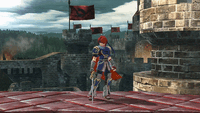
|
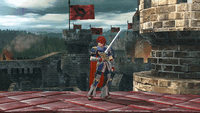
|
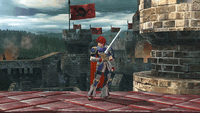
|
Idle poses
- Pumps his fist.
- Swipes his hand lightly against the Sword of Seals while holding it in front of himself.
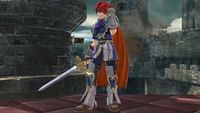 |
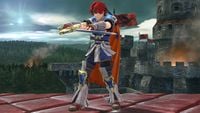
|
|---|
Crowd cheer
| English | Japanese | |
|---|---|---|
| Cheer | File:Fire Emblem Roy Cheer NTSC SSB4.ogg | |
| Description | Roy's our Boy! | |
| Pitch | Group chant |
Victory poses
- Swipes his sword once over his shoulder, then swipes it down and behind him while facing left, saying "真の戦いは、これからだ。", which translates to "The true battle, is soon to begin."
- Spins the Sword of Seals one and a half times and then sheaths it, saying "苦しい戦いだった。", which translates to "It was a painful fight." Replaces his old victory animation from Melee where his sticks the Sword of Seals in the ground.
- Flourishes his sword and poses with it by his side, saying "守るべきもののために、負けられない!", which translates to "For those whom I must protect, I will not lose!".
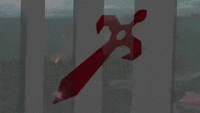 |
 |

|
|---|
In Competitive play
Notable players
Alternate costumes

| |||||||

|

|

|

|

|

|

|

|
Reveal Trailer
<youtube>w8XIj05irtU</youtube>
Trophy
- Roy
Roy, the main character of Fire Emblem: The Binding Blade, returns for the first time since Melee! In The Binding Blade, Roy led the troops of Pherae into battle in his ailing father’s stead, and now he brings his speed and talent for short-range combat into this game. His sword, the Sword of Seals, is uniquely powerful at the base of the blade.
Roy, the main character of Fire Emblem: The Binding Blade, returns for the first time since Melee! In The Binding Blade, Roy led the troops of Pherae into battle in his ailing father’s stead, and now he brings his speed and talent for short-range combat into this game. His sword, the Sword of Seals, is uniquely powerful at the base of the blade.
: Fire Emblem: The Binding Blade
- Roy (Alt)
His sword, the Sword of Seals, is uniquely powerful at the base of the blade. Flare Blade creates an explosion in front of Roy that can be charged by holding down the button. Take care, though, because at the highest levels of charge, Roy himself will catch fire and take damage! His side special, Double-Edge Dance, changes for each strike after the first depending on whether you hold up or down while attacking.
Flare Blade creates an explosion in front of Roy that can be charged by holding down the button. Take care, though, because at the highest levels of charge, Roy himself will catch fire and take damage! His side special, Double-Edge Dance, changes for each strike after the first depending on whether you hold up or down while attacking.
: Fire Emblem: The Binding Blade
- Critical Hit
For Roy’s Final Smash, he traps enemies in a circular swing of the blade, brings it up behind him, and then, in a blast of fire, brings the blade down for a powerful finisher! The downward attack is powerful on its own but doesn’t have much range, so make sure you’re close enough to hit your enemies with the full combo and really seal their fate!
For Roy’s Final Smash, he traps enemies in a circular swing of the blade, brings it up behind him, and then, in a blast of fire, brings the blade down for a powerful finisher! The downward attack is powerful on its own but doesn’t have much range, so make sure you’re close enough to hit your enemies with the full combo and really seal their fate!
Critical Hit (Roy)
Gallery
Roy attacking Captain Falcon.
Roy attacking Lucario.
Roy and Roy.
Roy with Zero Suit Samus and Wii Fit Trainer.
Roy posing with both Female and Male Robin.
Roy & Marth performing a side smash. Note that the sweetspot is highlighted by the trail left by their swords. Marth's Falchion's strongest part is at its tip while Roy's Sword of Seal's strongest part is at its hilt.
Trivia
- As with Mewtwo, Roy's pose in his official artwork is nearly identical to his Melee official artwork.
- Roy's introduction tagline references his sword, the Sword of Seals, also known as the "Binding Blade."
- The segment of Roy's trailer where he attacks Roy Koopa references how they share the same name. The official website and game both reference this fact, with a screenshot on his profile page and his All-Star clear picture on the 3DS, respectively.
- Roy's up smash shares the same name as Mega Man's forward aerial, Flame Sword.
- In Super Smash Bros. for Nintendo 3DS, Roy and Mr. Game & Watch do not taunt after choosing a path in Classic Mode. Roy instead does a fist pump, one of his idle poses. However, in the later updates, he does his down taunt.
- All of Roy's sourspotted attacks make a punch/kick sound effect instead of a slashing sound effect. This is carried over from Melee.
- Roy, Young Link and Toon Link are the only swordfighters in Super Smash Bros. whose swords consistently produce punch/kick sound effects instead of a slashing sound effect for the majority of their attacks, albeit Roy's coming from his sourspotted attacks.
- Roy is one of the four characters to use different voice clips when using any of his smash attacks. The other three are Wii Fit Trainer, Rosalina, and Ryu.
- Additionally, Roy and Ryu are the only two characters to use different sound clips when using battering items.
- Roy's sheath only appears in gameplay while using his Final Smash, Critical Hit, appearing on his back and disappearing abruptly once the Final Smash ends with Roy sheathing his sword while posing before quickly unsheathing it again.
- Like Dr. Mario, Roy has a unique stance from the character he is a clone of but has the same stance as them when holding an item, in Roy's case he goes to Marth's stance when holding a light item.
- The segment in Roy's reveal trailer when Roy performs his down taunt before a Superspicy Curry references "The Ultimate Curry", one of the winning photos of the Melee "Camera Mode Contest." [1]
- Roy, Mewtwo, and Jigglypuff have only one voice clip for being KO'd. For Roy and Mewtwo, this is a likely callback to their debut in Melee, where most characters only had one KO voice clip until Brawl.
- As another likely callback to Melee, when Roy is stunned, his corresponding voice clip loops constantly instead of playing only once.
- Roy is the only veteran from the Fire Emblem series to receive new voice clips.
- Roy is the only DLC veteran to not have had an already existing trophy of himself before his reveal.
- In fact, he, Young Link, and Snake are the only veterans not to have trophies in the base game.
- Roy is the last DLC veteran to be announced.
- Roy and Corrin are the only two DLC fighters to share a universe.
References
| Fighters in Super Smash Bros. 4 | |
|---|---|
| Veterans | Bowser · Captain Falcon · Charizard · Diddy Kong · Donkey Kong · Dr. Mario · Falco · Fox · Ganondorf · Ike · Jigglypuff · King Dedede · Kirby · Link · Lucario · Lucas · Luigi · Mario · Marth · Meta Knight · Mewtwo · Mr. Game & Watch · Ness · Olimar · Peach · Pikachu · Pit · R.O.B. · Roy · Samus · Sheik · Sonic · Toon Link · Wario · Yoshi · Zelda · Zero Suit Samus |
| Newcomers | Bayonetta · Bowser Jr. · Cloud · Corrin · Dark Pit · Duck Hunt · Greninja · Little Mac · Lucina · Mega Man · Mii Fighter (Mii Brawler · Mii Gunner · Mii Swordfighter) · Pac-Man · Palutena · Robin · Rosalina & Luma · Ryu · Shulk · Villager · Wii Fit Trainer |
|
| |
|---|---|
| Fighters | Marth (SSBM · SSBB · SSB4 · SSBU) · Roy (SSBM · SSB4 · SSBU) · Ike (SSBB · SSB4 · SSBU) · Lucina (SSB4 · SSBU) · Robin (SSB4 · SSBU) · Corrin (SSB4 · SSBU) · Chrom (SSBU) · Byleth (SSBU) |
| Assist Trophies | Lyn · Black Knight · Tiki |
| Stages | Castle Siege · Arena Ferox · Coliseum · Garreg Mach Monastery |
| Item | Killing Edge |
| Other | Sothis |
| Trophies, Stickers and Spirits | Trophies (SSBM · SSBB · SSB4) · Stickers · Spirits |
| Music | Brawl · SSB4 · Ultimate |
| Masterpieces | Fire Emblem: Shadow Dragon and the Blade of Light · Fire Emblem: Mystery of the Emblem |
